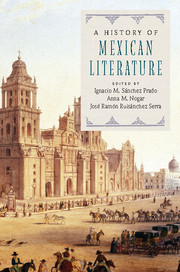Book contents
- Frontmatter
- Contents
- List of contributors
- Introduction
- PART I COLONIAL LITERATURE
- 1 The Languages and Literatures of Early Print Culture in the Colonia
- 2 A Chronicon of Crónicas: The New Spanish Prose Narrative
- 3 Theatricality and the Public Enactment of the Mexican Colonial
- 4 Sor Juana Inés de la Cruz: The Tenth Muse and the Difficult Freedom to Be
- 5 Jesuit Enlightenment: Interventions in Christianity and Intellectualism
- 6 Women in the Print Culture of New Spain
- 7 The Colonial Literary Scope: Empire, Letter, and Power
- 8 New Spain's Archival Past and Present Materiality
- PART II THE NINETEENTH CENTURY
- PART III TWENTIETH AND TWENTY-FIRST CENTURIES
- PART IV MEXICAN LITERATURE BEYOND BOUNDARIES
- Index
- References
6 - Women in the Print Culture of New Spain
from PART I - COLONIAL LITERATURE
Published online by Cambridge University Press: 05 July 2016
- Frontmatter
- Contents
- List of contributors
- Introduction
- PART I COLONIAL LITERATURE
- 1 The Languages and Literatures of Early Print Culture in the Colonia
- 2 A Chronicon of Crónicas: The New Spanish Prose Narrative
- 3 Theatricality and the Public Enactment of the Mexican Colonial
- 4 Sor Juana Inés de la Cruz: The Tenth Muse and the Difficult Freedom to Be
- 5 Jesuit Enlightenment: Interventions in Christianity and Intellectualism
- 6 Women in the Print Culture of New Spain
- 7 The Colonial Literary Scope: Empire, Letter, and Power
- 8 New Spain's Archival Past and Present Materiality
- PART II THE NINETEENTH CENTURY
- PART III TWENTIETH AND TWENTY-FIRST CENTURIES
- PART IV MEXICAN LITERATURE BEYOND BOUNDARIES
- Index
- References
Summary
In her spiritual autobiography, the Mexican Capuchin nun María Marcela Soria emphasized the challenges of explaining herself through the act of writing:
Con grandes deseos de explicarme tomo la pluma, pero en ellos me quedaré, porque emprender lo imposible es manifiesto desatino. Intentar comprender lo incomprensible es temeridad reprehensible; explicarme digo ser empresa imposible. (2006: 89)
Although writing is perceived as the instrument par excellence to explain oneself to others, for Sor María Marcela, it always fell short of fulfilling its task. Writing would never be able to capture the self in its entirety. Yet despite challenges and limitations, María Marcela did write, and thus became part of that privileged group of colonial women who came to be known among their peers thanks to the written word. María Marcela's spiritual autobiography only circulated as a manuscript within her convent. Her case serves to remind us that, for women in colonial Spanish America, writing only offers a partial view of female society, underscoring how the politics of colonial printing determined what we know now about women in colonial society. Women's voices were heard precisely because their writings were published. Print culture enabled some of these voices to be remembered, while others were forgotten or silenced.
This chapter discusses the importance of women's writing in New Spain by offering a panoramic view of the politics of writing and printing, as well as the modes, subjects, and nature of such production by women in pre-Columbian and colonial Mexico through the Enlightenment (1805–1823).
Women and Códices
In 1994, Elizabeth Hill Boone proposed an encompassing definition of writing when referring to alternative ways of recording knowledge in Mesoamerica and the Andes prior to and after the arrival of the Europeans to the so-called New World. For Boone, writing is not only about words, but also includes any “graphic system that keeps and conveys knowledge” and “presents ideas” such as the códices (Boone, 1994: 3). The Mesoamerican system of writing included hieroglyphics, abstract signs, pictorial images, and glottographic and semasiographic systems (1994: 17). Throughout Mexico and Central America, the person in charge of painting these signs on paper, the equivalent of a scribe, was known as a tlacuilo, and scholars have usually referred to this individual as a wise male.
- Type
- Chapter
- Information
- A History of Mexican Literature , pp. 97 - 112Publisher: Cambridge University PressPrint publication year: 2016
References
- 1
- Cited by



